This story is the first of a two-part series on the impact of global inflation on Unbound families in poverty and how staff are helping them cope. Read part two: Reviving Hope.
June 27, 2023 | Child Sponsorship
Paying the Price
Global inflation impacts families living in poverty the hardest
By Kati Burns Mallows
La Bendición (The Blessing) is a one-room restaurant in the Nueva Jerusalem community in Medellín, Colombia, where diners could once order a full lunch plate with drink for just 10,000 pesos ($2.25 USD).
La Bendición’s owner is a 26-year-old single mother of two, Maryeli, whose dream is to be a successful entrepreneur. At one time, she would have said her business had made this dream a reality and that it gave her a good income.
But, as she stands at the sink peeling potatoes to make the day’s lunches, she is acutely aware of how her business has changed in the last few years. Now the rising cost of food products in the markets means she can only afford to buy half of the produce needed biweekly to operate her restaurant. To compensate, she’s increased the cost of her lunch plates by almost 50%, but that’s impacted how many she sells in a day. Whereas before she sold between 8-10 lunches in a day, now she’s lucky if she can sell 2-3.
La Bendición used to be exactly what she once chose to name it — a blessing — and it still is; Maryeli still has dreams. But lately sales have been so bad, she’s had to make tough decisions about how she spends her income, cutting things to stretch her budget.
Maryeli is one of the almost 700 million individuals in the world who was already living below the poverty line. For her, making tough decisions means going without a meal some days so that her children won’t have to.
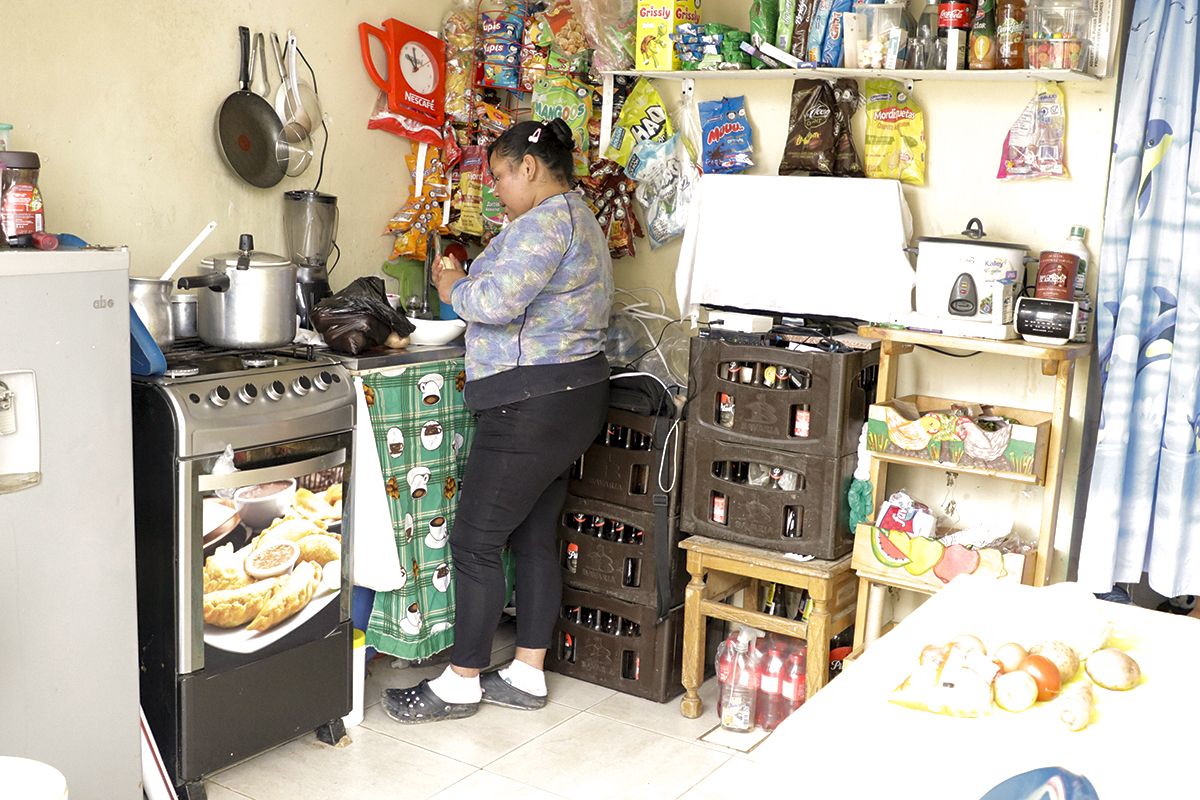
Maryeli prepares lunches in her small restaurant, La Bendición. Before inflation, daily lunch plates used to include meat, rice, soup, salad, potatoes and juice for a flat $2.25 USD.
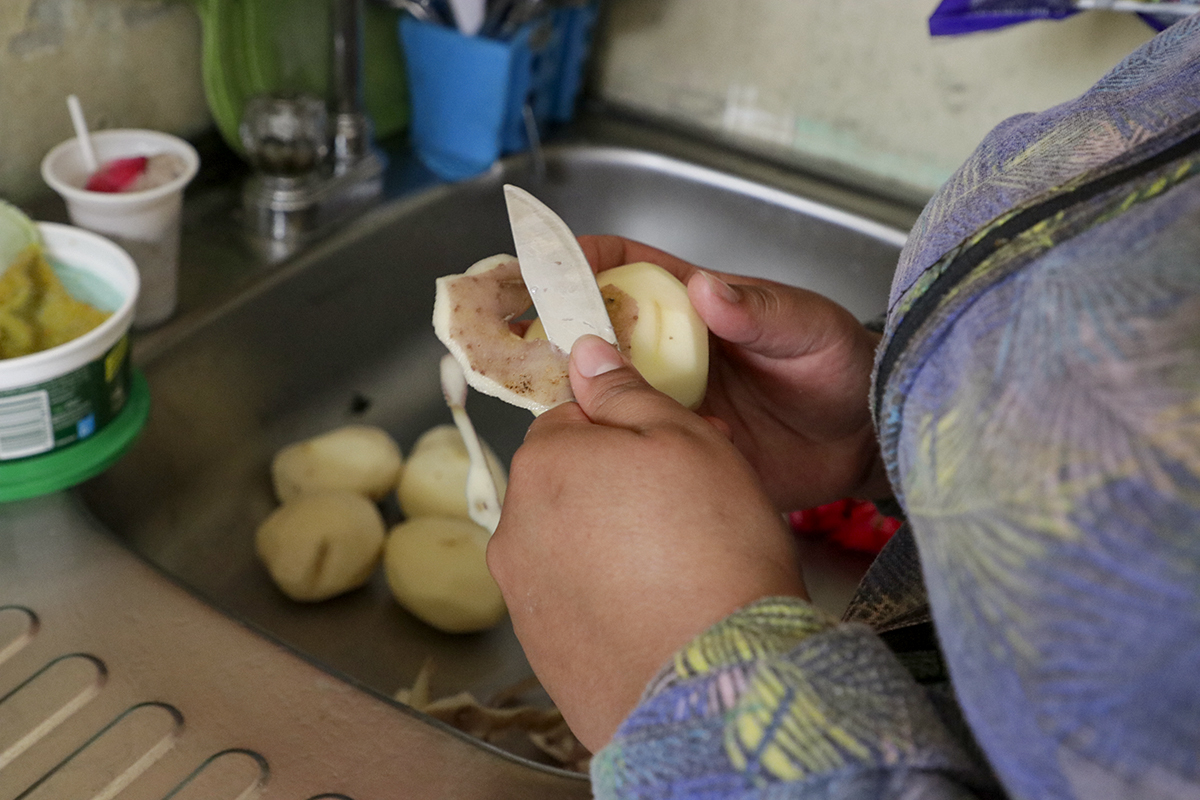
Maryeli peels a small potato at the sink in her restaurant. Three years ago, when Maryeli’s 9-year-old daughter, Aidaly, became sponsored through Unbound, the family cried with happiness. At the time, the sponsorship benefits allowed Maryeli to solve some of their financial hardships. She learned how to be independent and to set goals.
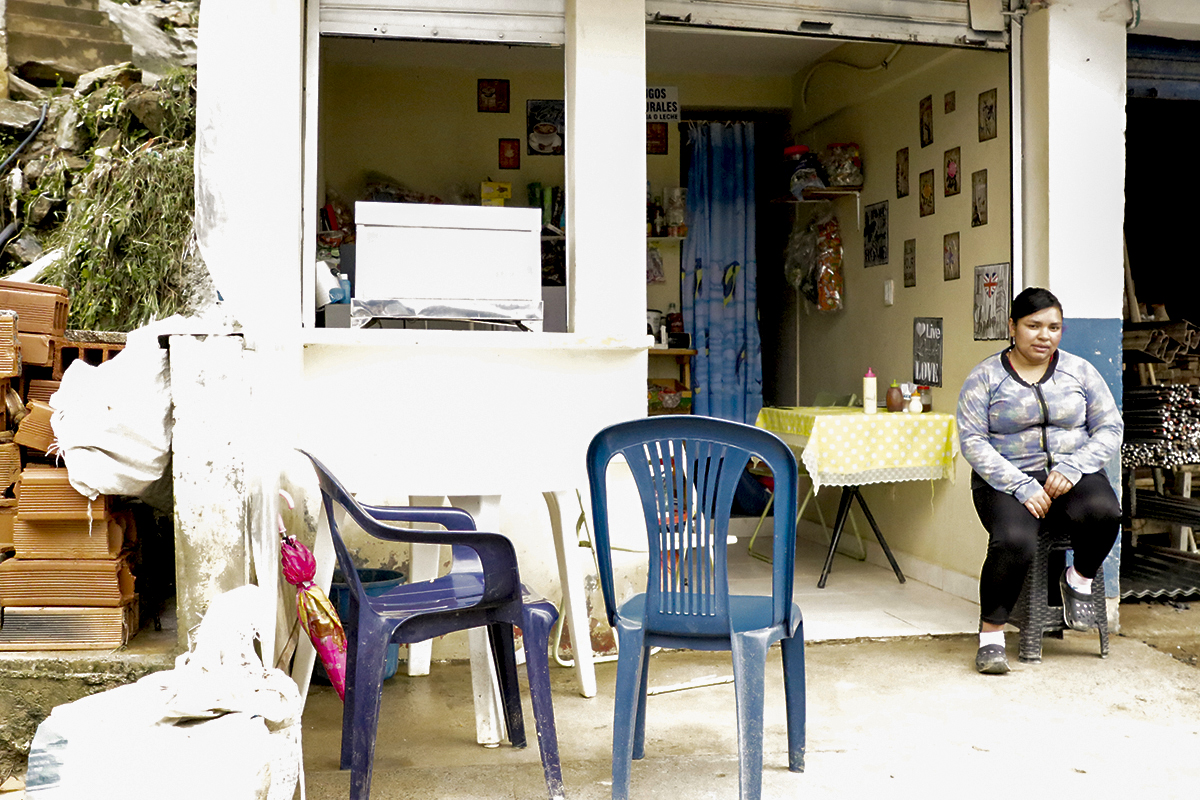
Maryeli sits in front of her restaurant, awaiting customers. This year, the rent for her storefront increased, and she had to take out loans to make the payments. Some days, she skips meals so her two children can still eat. She feels like her family is no longer progressing on the path out of poverty.
Rising inflation leads to crisis for the world's poorest
While the aftermath of the pandemic and the conflict between Russia and Ukraine, among other factors, has left countries worldwide reeling under rising inflation, nowhere has its impact been more profound than in developing countries.
Surging economic activity, supply-chain disruptions and soaring commodity prices combined in 2021 to push global inflation to its highest level since 2008, according to Brookings, a nonprofit public policy organization. Among emerging markets and developing economies, inflation reached its highest level since 2011.
Prices rose for commodities like gas, oil, coal, fertilizers, wheat, corn and seed oil. Price spikes erode the value of real wages and savings, immediately impacting the poorest households because most of their disposable income is spent on essential goods and services, according to the U.N.
Unbound Latin America Regional Project Director Mónica Gómez makes her home in Colombia, a country that imports approximately 30% of the food it consumes. She oversees seven Unbound programs across six countries in Latin America, serving more than 48,000 sponsored friends and their families. According to Gómez, the crisis has gotten worse during the post-pandemic period, undermining the system of support and goal-orientation strategy that Unbound teaches families to establish to advance on their path out of poverty.
“Little by little, [in Unbound] they transform their lives, unlock their potential, and build support networks among themselves and within their communities,” Gómez said. “It is precisely this part that we see has been the most affected in recent years.
“We have seen how families have had to use their savings for a specific purpose of housing or education, to cover rent and pay for public services. Families now need to pause on the goals they had set for themselves and focus on surviving.”
Though Bloomberg News said in June that global inflation is projected to gradually edge downward, core price increases in many countries are expected to remain above pre-pandemic levels beyond 2024.
In 2022, Unbound disbursed more than $115 million in assistance to its programs around the world. The funds provided direct cash assistance to individuals and families, in addition to covering costs of local programs that give critical support.
Ninety-eight percent of Unbound sponsored friends and their families receive their sponsorship benefits via cash transfers, leaving them with the power to decide how best to use their funds.
But increases in global inflation are eroding the purchasing power of direct cash benefits.
Throughout the last 10 years, even before COVID-19, inflation has steadily risen across the 18 countries served by Unbound; the accumulated rate of inflation across all these countries has averaged 40%.
The strength of the U.S. dollar over the same time has helped offset some of the impact of inflation, according to Dan Pearson, Unbound’s chief international programs officer.
“Exchange rate gains coupled with gradual increases in the U.S. dollar monthly transfer amount have kept the average purchasing power of the monthly transfer amount steadier,” Pearson said.
However, the purchasing power of sponsored families has been falling, dropping 8.3% since 2020.
Inflation is winning, and those on the losing side are the families living in poverty — Unbound’s families.
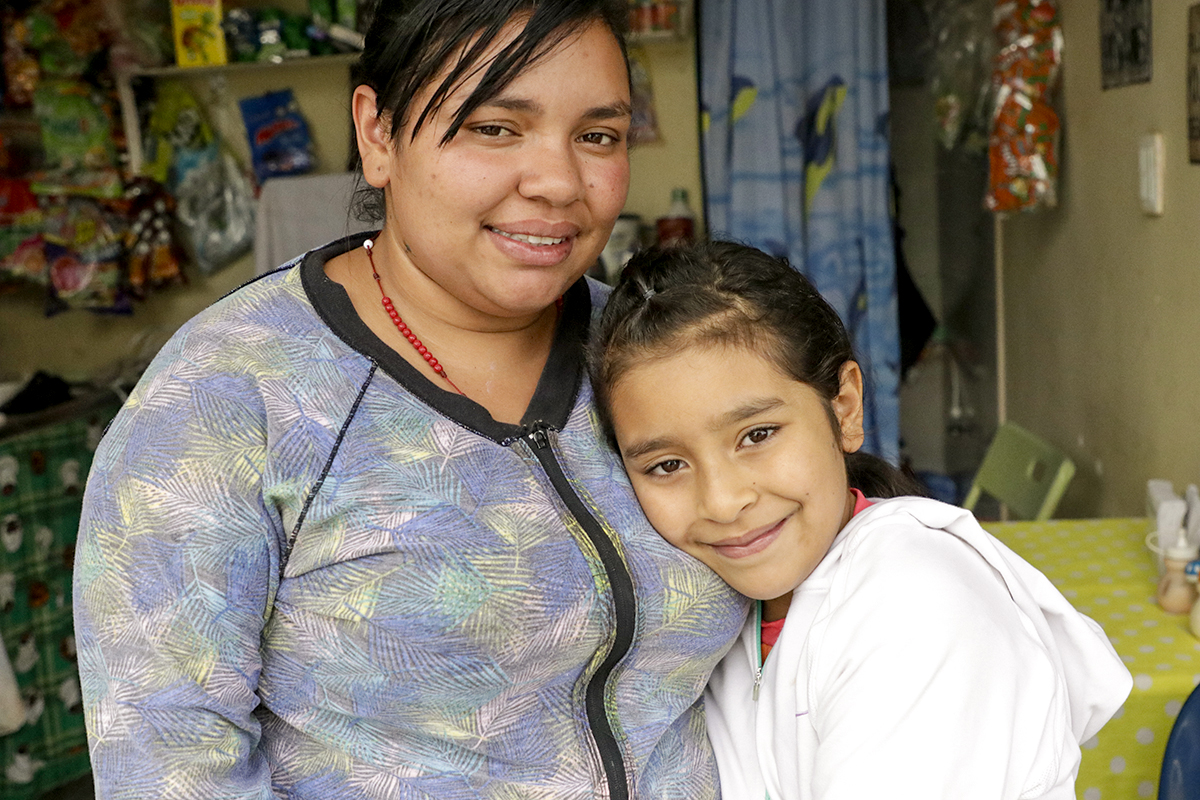
Maryeli (pictured with sponsored daughter Aidaly) earns between $27-$29 USD from her business weekly — less than half of what she used to earn before inflation cut into her income. Despite their hardships, Maryeli still holds onto her hope of one day being able to grow her business — it’s all she has.
Families are experiencing food insecurity
According to the World Bank, domestic food price inflation remains high around the world, topping 5% in 70.6% of most low-income countries. In June 2023, the Food and Agriculture Organization of the United Nations (FAO) and the World Food Programme (WFP) warned that “food security is likely to deteriorate further in 18 hunger hotspots across 22 countries between June to November 2023.”
Countries that Unbound serves — including Kenya, Guatemala, Honduras and El Salvador — are of “high concern” as hunger hotspots.
In the rural Santa María Visitación, Sololá, community of Guatemala, Pascual and his wife, Nora, are trying to feed their family of five on the $60 USD he earns per week from farming. Their two oldest daughters are both sponsored through Unbound.
They had intended to use their daughters’ sponsorship funds for their educations, but sometimes when Pascual can’t find farming work, they must use half of the monthly benefits to buy corn, sugar, beans and rice.
Nora typically spends $13 USD per week on the family’s food and meals. Daily snacks provided free to the children through their school program have helped the family with their household food supply.
“Whether you like it or not, you have to figure out how to make it work because if there’s nothing, what else can you do?” Nora said. “The girls adapt to the basics, and their dad enjoys cooking; he can make a delicious salad with just one tomato.”
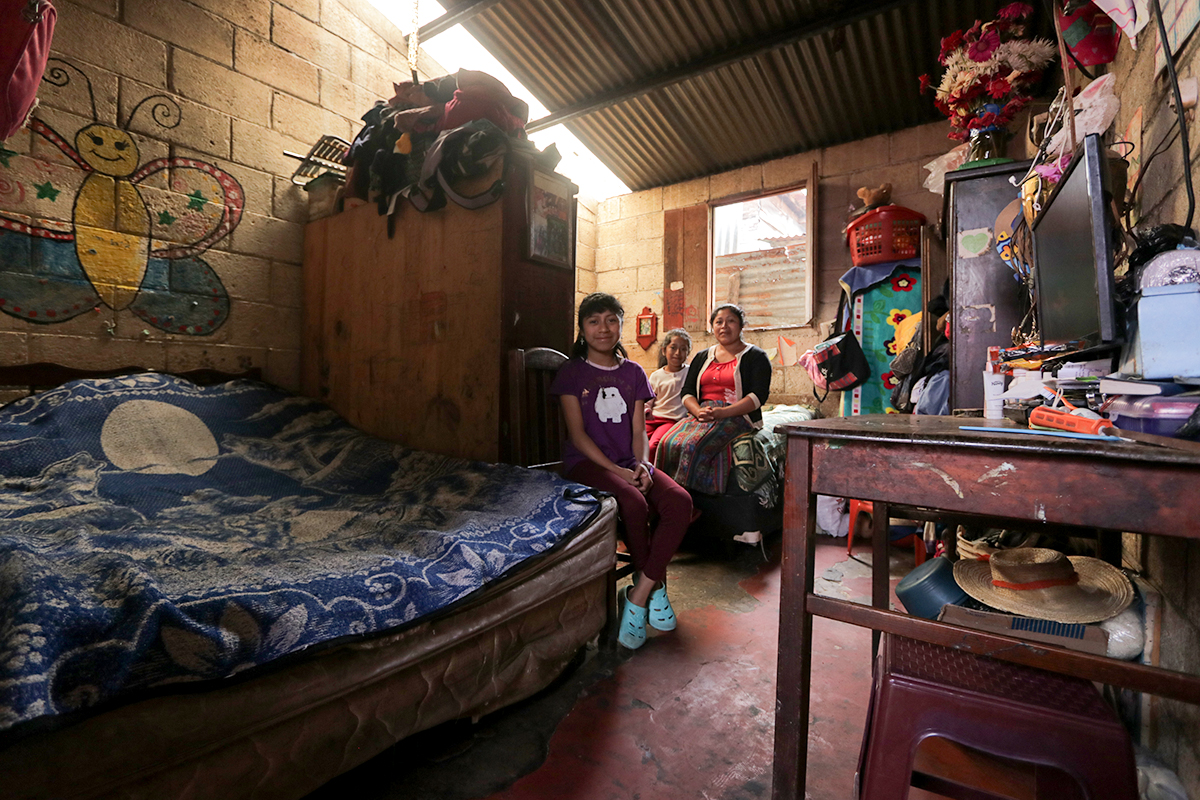
Nora (back right) sits in the family’s bedroom in Guatemala with two of her daughters, Cristel, who is 12 and sponsored through Unbound (foreground), and Karen, 8. Though the family sometimes must prioritize paying utility bills, they’ve had to add internet access to their expenses since most of the children’s schoolwork still must be accomplished virtually.
In Africa, weather extremes — such as prolonged drought — have also been a driver of acute food insecurity.
In Nairobi, Kenya, 78-year-old sponsored elder Grace is trying to practice subsistence farming of beans and maize. But, if the drought doesn’t get her crops, the monkeys do, and she barely grows enough to sometimes feed her own family of six. When Grace became sponsored over five years ago, the funds used to be enough for her to fill the lower section of the cupboard in her home with food. Now the cupboard sits empty.
The family consumes a 2-kilogram package of maize flour daily (an item in her area that has risen in cost from $0.5 USD to $2.30 USD). When that runs out, Grace buys food on credit at the market and pays her debt with her next sponsorship fund distribution. She channels all her energy (and funds) into ensuring her family has food each day, typically eating only ugali (a type of porridge) herself.
“All people are crying (struggling),” Grace said. “When you visit your neighbor, you realize he/she is crying, too. No one is able to help another; all are crying like me.”
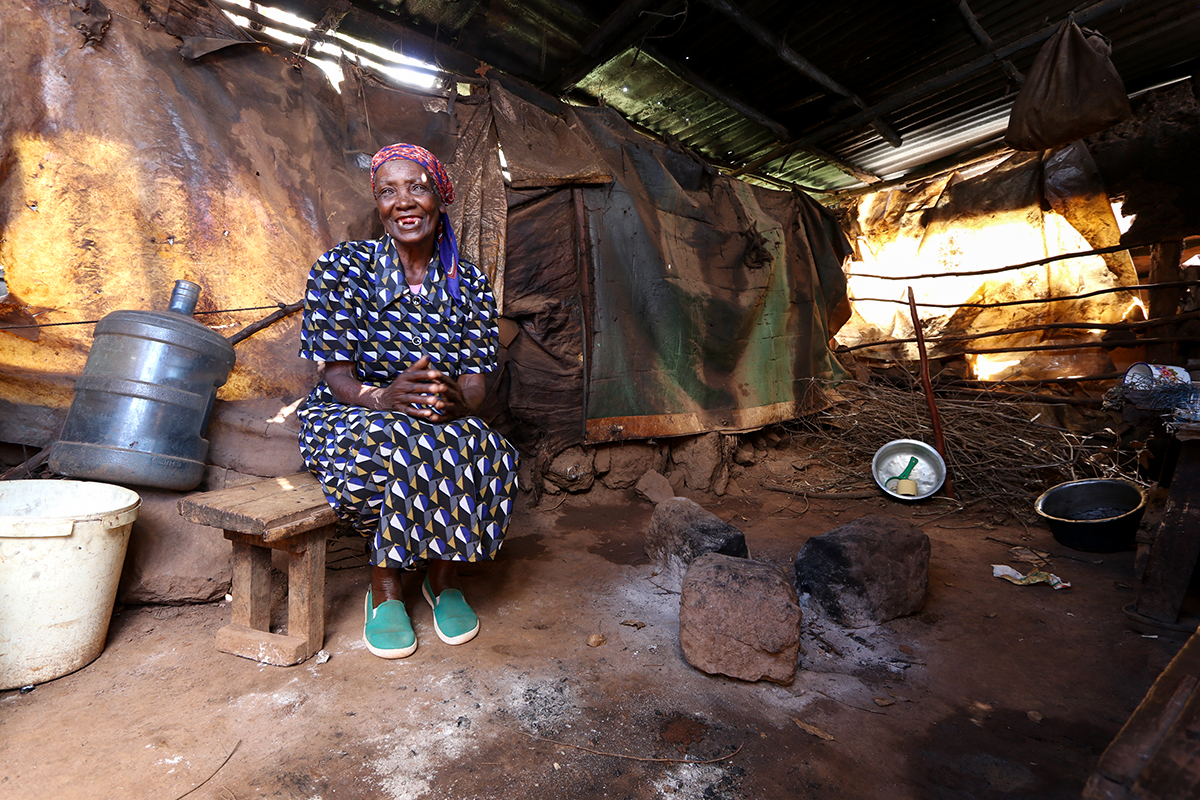
Sponsored elder Grace sits in front of the cooking pit in her home in Nairobi, finding the courage to smile through her struggles. On top of having to seek food daily, the roof of her home leaks when it does rain, compounding her worry.
Families have nowhere to turn in times of a health crisis
In many developing countries, high inflation has also impacted the health care options of people living in poverty, who often have extremely low rates of health insurance coverage and poor access to health services.
Besides driving up the cost of food, transportation and housing, quality health care has become increasingly difficult for families to acquire, said Angélica Lozada, Unbound coordinator of the Cuernavaca Program. In Mexico alone, more than 35 million people, representing 28.2 percent of the country’s population, were found to lack access to health services.
“Most sponsored families don’t have regular salaries; their income is not formal,” said Lozada, who has been working with Unbound for 20 years. “They work daily, getting paid for each day or per job. Just imagine the pressure of everything being very expensive and [then] not having work every day.”
Mayela, a mother of three, including two sponsored children, said the salary her husband earns as a restaurant waiter in Cuernavaca is what her family uses daily for their food expenses. A good day of work is when her husband brings home between 300-400 pesos ($17-$23 USD).
But the family’s daily household expenses are also $17 USD. To stretch the budget some weeks, they’ve cut out fruit from their diets and sometimes can’t afford to buy meat, opting instead to eat just vegetables. They’ve limited the cost for transportation by walking most places they need to go.
With no health insurance, Mayela lives in fear of the family needing health care. They forego visiting the public clinic sometimes for appointments at the local pharmacy, where they’ll only need to pay for medication.
“That’s when we feel the impact because we spend money on medications,” Mayela said. “However, we try to fight each day and to find a way to overcome these challenges.”
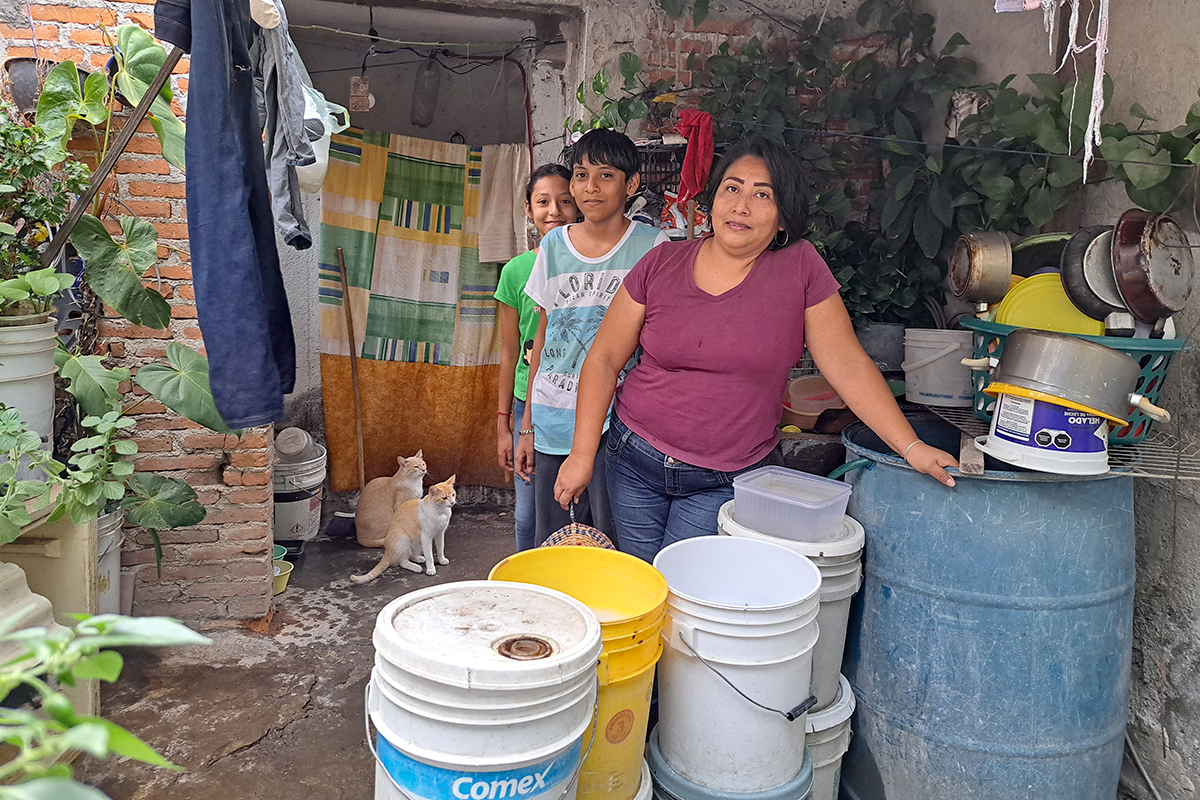
Mayela with sponsored children, son Luis Angel and daughter Yoali, at their home in Cuernavaca. Mayela hears troubling stories from her neighbors who have had to go into debt to pay for medical tests and medication when their children got sick.
In Unbound’s Costa Rica program, coordinator of the Los Chiles subproject, Carolina Cordero Cruz, said that between 30-40% of the beneficiary population consists of families who are immigrants from Nicaragua, making their living situations particularly precarious. Without proper documentation, it’s difficult for them to obtain medical insurance, formal employment, access to scholarships, school meals or other forms of assistance.
Without formal work as an option, many practice entrepreneurship, are hired to do day labor, or work seasonal jobs such as harvesting yucca or picking coffee, none of which come with health insurance coverage.
“Given that they don’t have enough income even to cover basic needs like food, insurance becomes a low priority,” Cruz said. “If they get sick, their family’s situation becomes even more complex.”
Claudia, mother of sponsored child Jefferson, immigrated with her family to Costa Rica six years ago to escape conflict in their home country of Nicaragua, and the family of seven lives in an informal settlement. Claudia’s husband works in construction, and she sells tamales. Sometimes the only meal the family can afford consists of beans.
Without health insurance, they often can’t get into the local clinic when sick due to insured patients being given priority. When there’s no space at the clinic, they go to the emergency room only to be told their issue is not an emergency and that they must make an appointment.
We have seen how families have had to use their savings for a specific purpose of housing or education, to cover rent and pay for public services. Families now need to pause on the goals they had set for themselves and focus on surviving.
— Mónica Gómez, Unbound Regional Project Director
Families are falling further behind in education
The cornerstone of an Unbound sponsorship is the requirement that sponsored children and youth must stay in school. Most families choose to use their sponsorship benefits to pay for their children’s school tuition, fees or uniforms. But formal education has also been impacted by inflation.
“The current situation causes a decrease in their access to basic needs such as food, water, electricity,” said Cruz about families in Costa Rica. “Work hours are reduced, or people are laid off. Education becomes … almost last [in importance].”
The situation of Claudia’s sponsored son, 14-year-old Jefferson, is the perfect example of the educational challenges facing Unbound families during this time. One book for Jefferson’s classes cost $14.88 USD — more than half of his monthly sponsorship benefit disbursement — but he needed two books. Claudia paid for one book and was lucky enough to be able to get photocopies of the second book Jefferson needed via another classmate.
Jefferson also does not qualify for lunches from the school cafeteria. If Claudia can afford it, she sends her son to school with a juice pack and cookies to help him get through the nine hours he’s away for school.
“It’s not a proper meal for him,” Claudia said. “Sometimes the money (sponsorship) is not enough.”
In Kenya, the rising cost of school tuition and food are the two main challenges Unbound families are facing. To keep a child in school in Kenya is expensive, with the cost of tuition increasing as the child progresses, according to Unbound Nairobi Coordinator Peter Ndungo.
Some families have gotten so far behind on paying tuition balances at school that their children could no longer attend. At the project level, Ndungo said Unbound used emergency funds to pay off the balances so that children could return to school.
“In most cases, families at the lower levels of society may not understand the dynamics of global conflict … they don’t understand why [costs] are so high,” Ndungo said. “It’s tough trying to explain when you visit and find that a family has not eaten for a day.”
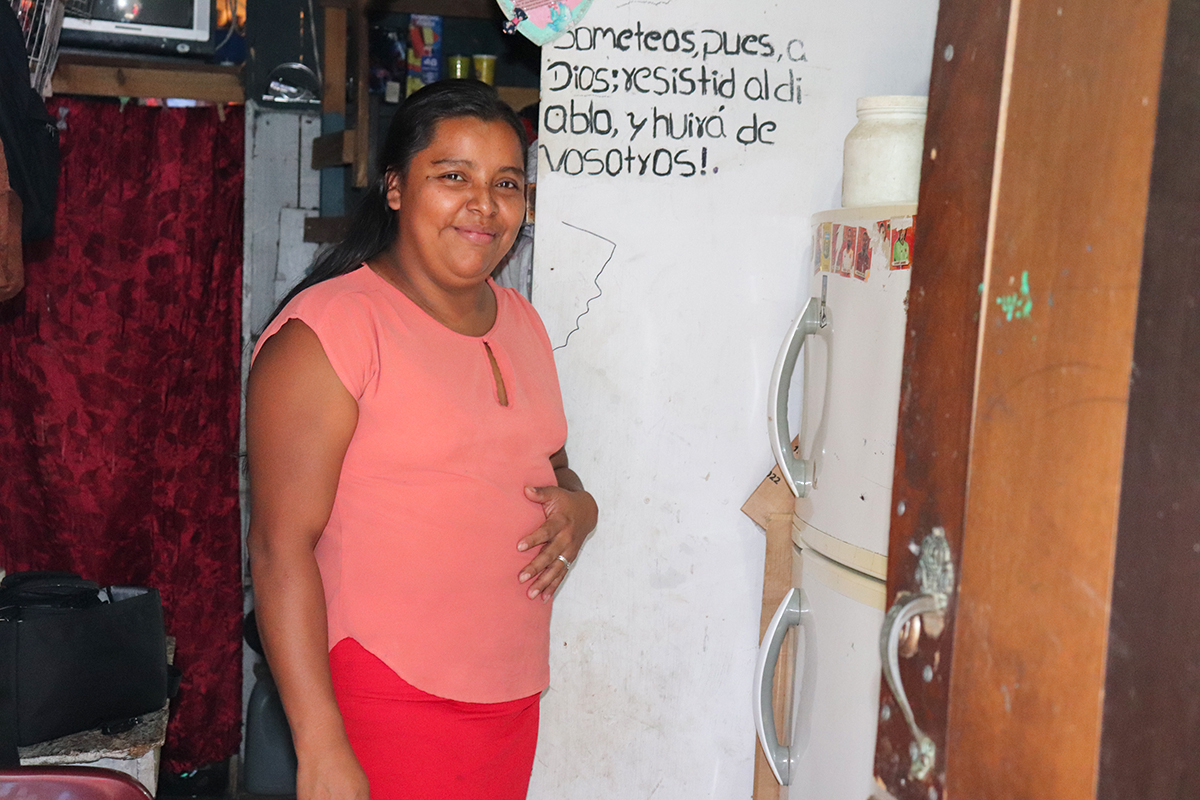
Claudia , mother of sponsored child Jefferson in Costa Rica, often must choose between paying for her son’s transportation to school or for his school lunch, but rarely can the family of seven afford both.
Sponsors can take additional action to help families now
With people all over the world reeling from hardships brought about by the rising cost of living, it might feel impossible that your support could still bring hope to someone on the other side of the globe — but it can and does give them the power to keep putting one foot in front of the other day in and out. As a sponsor, you can take additional action now to help your sponsored friend(s) and their family.
Ndungo encourages sponsors to keep writing to their sponsored friends. “They appreciate very much when they hear from you, and you will learn about their challenges,” Ndungo said. “Encourage their families to continue moving on with life, and if there’s anything [more] you can do … the need is there.”
The monthly sponsorship contribution amount sponsors are asked to give is $40 or more, and 44% of all sponsors give at this current level. To help Unbound families struggling now to overcome financial challenges due to inflation, sponsors can make a huge difference by increasing their monthly sponsorship amount, even just by $3, $5 or $7.
Follow the below steps to act now:
- • Visit Unbound.org/ICanHelp to log in to your Unbound account.
- • Under "My Commitments," click the plus sign next to the monthly contribution amount for your sponsored friend.
- • On the "Increase Monthly Amount" screen, click the plus sign again to increase your support.
- • Click save.
If you're not already a part of changing the lives of Unbound children, youth and elders living in poverty, begin a sponsorship today.
Unbound Regional Reporters Director Henry Flores and regional reporters Oscar Tuch, Josue Sermeño, Carolina Pulgarin and Nickson Ateku contributed information and photos for this story.